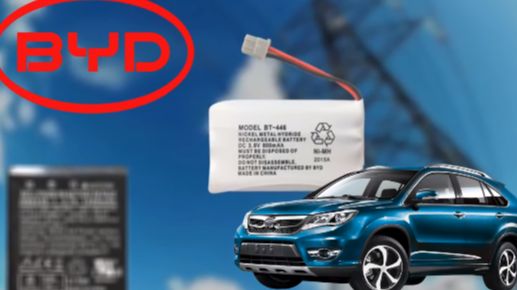The rise of the ridiculed
The rise of BYD is undeniable, even Elon Musk, CEO of Tesla, has to admit the formidable competitive ability of the Chinese car manufacturer, despite previously mocking the company as it rose from humble beginnings to touch the pinnacle of glory. BYD has gradually conquered the market, asserting its position step by step. The question is how a manufacturer of affordable phone batteries can transform dramatically to become the king of electric cars as it is today.
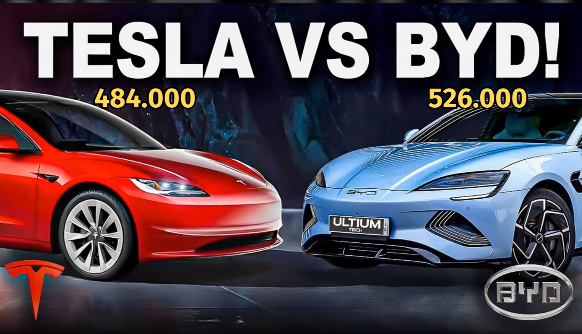
In the last quarter of 2023, BYD sold 526 electric cars, surpassing Tesla's 484,000 units. This is the first time BYD has outsold Tesla in electric car sales, marking a significant milestone in its development history. This success did not come by chance; BYD had meticulous and thorough preparation over many years. Established in 1995 with only 20 employees, BYD initially was a lithium-ion battery manufacturer for mobile phones. Recognizing the huge potential of the smartphone market, founder Wang Chuanfu transformed BYD into a battery supplier for giants like Motorola and Nokia.
In 2003, BYD officially entered the automotive industry by acquiring an auto company. The first BYD F3 car was launched in 2005, equipped with an internal combustion engine. Although F3 was quickly noticed by consumers for its significantly lower price compared to competitors in the same segment. In 2008, BYD continued to affirm its ambition in the electric vehicle sector by introducing the world's first plug-in hybrid model, the F3DM. Despite not achieving the expected success, the F3DM laid the foundation for BYD's development in electric vehicles. Also in the same year, BYD received a $232 million investment from Warren Buffett, which helped boost the company's electric vehicle ambitions.
In 2020, BYD introduced the Blade battery, a type of LFP lithium iron phosphate battery that is cheaper and considered safer than other lithium-ion batteries. The Blade battery was then applied to sports sedans and other BYD models. Thanks to continuous efforts, BYD's electric vehicle sales surged from 131,000 units in 2020 to 1.57 million units in 2021. One of the key factors contributing to BYD's success is its ability to control the battery supply chain. Self-producing batteries allows BYD to be proactive in the supply chain and reduce production costs, creating a competitive advantage over its rivals. In addition, BYD focuses on the domestic Chinese market, where the demand for electric vehicles is rapidly increasing. China is currently the world's largest electric vehicle market, accounting for about 90% of BYD's sales.
With the achievements attained, BYD is aiming to expand its market share globally, especially in the European market. The company has introduced three models in Europe and become the official electric vehicle sponsor of the Euro 2024 football championship. However, BYD will face numerous challenges in its international market conquest. Competitors such as Tesla, Volkswagen, and traditional car manufacturers are heavily investing in electric vehicles. Nevertheless, with what has been demonstrated, BYD can confidently rely on its competitive capabilities and maintain its leading position in the global electric vehicle race. The race between BYD and Tesla in the next 3 to 4 years promises to be intense and unpredictable.
Vertical integration
No longer an unfamiliar car brand, BYD is rapidly expanding beyond the Asian domestic market to conquer the world. Since launching its passenger car brand in Europe in October last year, BYD has quickly penetrated 15 European countries in just 11 months. BYD's rise is closely linked to the global electric vehicle market boom and strong support from the Chinese government. Incentive policies such as tax reductions have created favorable conditions for domestic electric vehicle manufacturers like BYD to develop, helping them gain a significant market share in their home turf.
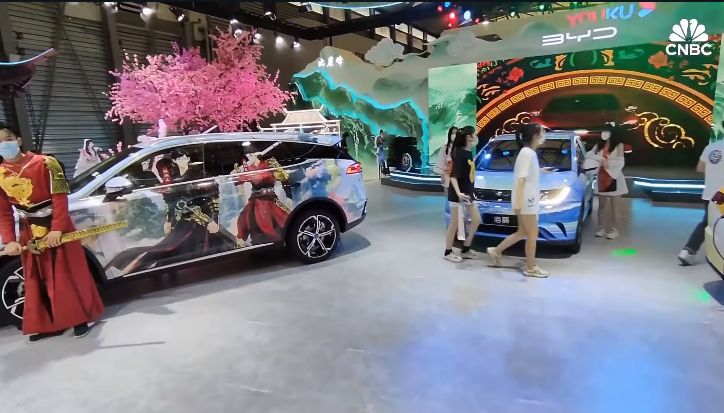
The clearest evidence is that BYD currently holds a 35% market share in electric vehicles in China, far surpassing Tesla's 7.8%. However, BYD's success is not only due to government support. While Tesla focuses on the luxury segment with elegant designs and a strong brand, BYD takes a different approach by focusing on the affordable segment and mass production. This strategy allows BYD to provide customers with electric vehicles with equivalent features but at a more affordable price compared to competitors. The secret to BYD's success also lies in its vertically integrated business model. Instead of solely focusing on electric vehicles, BYD also produces vehicle batteries and various other types of vehicles. Its large-scale production helps BYD reduce battery production costs, providing a competitive advantage over American and European competitors.
Furthermore, BYD also manufactures a large portion of car components internally, helping them better control the supply chain, reduce additional costs, delays, and post-sales issues that have previously posed challenges for Tesla. Approximately 75% of the added value of a BYD vehicle comes from internal production activities. BYD calls this the vertically integrated strategy, allowing them to respond more agilely to the market, improve customer service quality, and develop their brand more effectively. Expanding into Europe To consolidate its leading position, BYD is actively investing in ensuring a stable supply of lithium, a crucial raw material for electric vehicle batteries. At the same time, the company is also aiming to expand into the international market. However, BYD's global expansion path is not without obstacles.
The Southeast Asian and Australian markets are seen as potential markets with increasing demand for electric vehicles. BYD has achieved initial success in Thailand. A major obstacle for BYD is the European market, where the influx of Chinese electric vehicle manufacturers, including BYD, has faced opposition from European car manufacturers. The European Commission is investigating allegations of unfair Chinese government subsidies to the domestic electric vehicle industry, which could lead to import duties on Chinese electric vehicles. This move could disadvantage BYD but also create risks for European manufacturers.
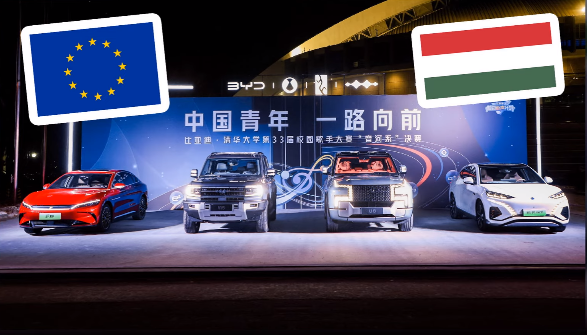
If Chinese electric vehicles are subject to tariffs, China could retaliate by imposing tariffs on European cars, causing damage to both sides. To overcome this barrier, BYD plans to build an electric vehicle manufacturing plant in Hungary, becoming the first Chinese company to produce cars in Europe. This move demonstrates BYD's efforts to alleviate EU concerns and prove its long-term commitment to this market. Additionally, the EU is also working on building its own battery supply chain to reduce dependence on China. This poses a significant challenge for BYD and other electric vehicle manufacturers in ensuring a stable supply of raw materials.
The battle in the US
The US, the most challenging market, is becoming a focal point of attention. The political tensions between the US and China are making BYD more cautious in approaching this market. Professor Ferdinand Dudenhoffer, an automotive expert, believes that the geopolitical conflict between China and the US is a major obstacle. BYD may consider building a plant in the US after succeeding in Europe. The lack of domestic production facilities and supply chains will be a major hurdle for Chinese companies, especially BYD, when entering the US market.
Although BYD has been supplying electric buses to the US for many years, it has not officially entered the car market there. The 27.5% import tax that the US imposes on Chinese cars further complicates BYD's path. Meanwhile, Tesla, the former electric vehicle king, is facing increasing competition pressure from the affordable car segment. The key for Tesla is to provide an affordable model, which could be a small C-segment car with a starting price of around 25,000 Euros. There are rumors that the Model 2 will be introduced next year and target this segment.
Can BYD maintain its leading position?
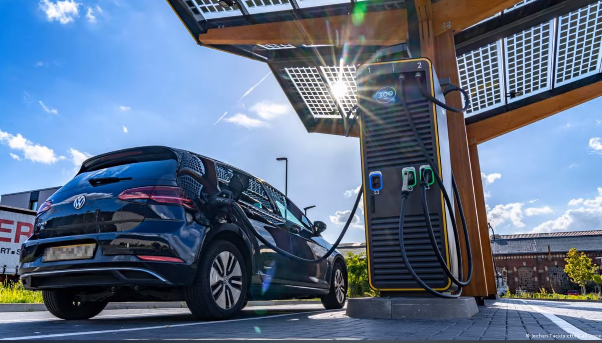
Dudenhoffer believes that Tesla and BYD will be the leading names in the electric vehicle market in the coming years. Volkswagen is also a formidable competitor, but the gap between them and the two aforementioned names is quite significant. However, this battle is not limited to tech giants; traditional car manufacturers, especially German brands, are striving to keep up with the trend. Dudenhoffer's most interesting observation is not the battle between Tesla and BYD, but how long-standing car manufacturers with hundreds of years of experience will adapt and compete with these newcomers.
Innovation and pricing will be the key for German brands like Volkswagen to compete with BYD and Tesla. Dudenhoffer asserts that German manufacturers need to be more innovative than Tesla and Chinese competitors; otherwise, they will not be able to justify higher prices for their products.
